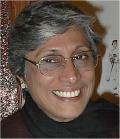The Independent Newsweekly
| National
Catholic Reporter
The Independent Newsweekly |
| Global Perspective |
| April 23, 2003 |
Vol.
1, No. 4
|

Virginia Saldanha is a woman activist working in India for the empowerment of women through Church institutions as well as networking with secular organizations in the struggle for justice and peace. "This simultaneous rise [of fundamentalism in world religions] has produced a domino effect of hatred and violence that is causing problems for people who strive for an inclusive social activism and particular problems for Christians in Asia." |
Fundamentalists are not rooted in the truth of their religions By Virginia Saldanha MUMBAI, India -- Watchers of the world scene have witnessed many scenes of violence in the last year, much of it laid at the feet of religionists.
The extreme right wings of the world's four main religions (Christianity, Islam, Hinduism and Judaism) seem to be on the rise and gaining strength. Furthermore, the rise is coupled with the consolidation of political power by an elite class of politicians and business interests. We have seen this process unfold in India. Religion in India had always been considered a private matter. People worshipped, celebrated festivals, and held their beliefs privately. India also has a history of being very tolerant of different religious traditions. Groups who fled persecutions in their home countries -- like the Parsees and Jews -- were welcomed here. Problems began to surface when the colonialists brought with them missionaries who promoted Christianity aggressively. Some would say religion was being used to consolidate political and economic power. In contemporary times, Hindu fundamentalists seem to have taken their cue from their experience with their colonial masters. While India has seen the rise of Hindu fundamentalist groups, Muslim countries have their own local brands of fundamentalist groups, and the Christian West has a special brand of preachers who are seemingly more adept at drawing out money than demons. It seems that the growth of fundamentalists in all religions has evolved as a response to each other. As an activist recently told me, "All fundamentalists have the same agenda, namely, gaining political power to boost their economic power." This simultaneous rise has produced a domino effect of hatred and violence that is causing problems for people who strive for an inclusive social activism and particular problems for Christians in Asia.
This last point is most worrisome for me, a Christian living in Asia. To Asians, the powerful West is synonymous with Christianity. It is also synonymous with military, political and economic domination. Asian countries struggling to come into their own as economic and political entities have much to fear from Western domination. President Bush's strongly "fundamentalist Christian" ideology reinforces these fears. Hence in some countries in Asia where Christians are minorities, they are looked upon with suspicion and become soft-targets for majority religious groups venting anger against the West. Civil society the world over is trying to raise a voice, but this voice is being ignored. Where do we go from here? people ask. For those of us with inclusive religious beliefs, the answer to the question is in our religious traditions - whatever those may be. Fundamentalists achieve their goal by using religion to gain control over the lives of people. Fundamentalists interpret religion to suit their own ends. They claim to speak and act in the name of God. They prescribe religious rituals that absorb people's attention rather than help people to think and analyze situations for themselves. Fundamentalists are not rooted in the truth preached by the founders of their religions. Religious people who struggle for a more inclusive and peaceful world should return to the roots of our religions where we will find the truth. Those of use who are Christians will remember the words of Jesus spoken in the Sermon on the Mount, "Blessed are the poor in Spirit …Blessed are the peace makers, Blessed are those who work for justice, …." In the struggle against fundamentalism, we can also remember the words, "Those who live by the sword die by the sword." |
| Copyright
© 2003 The National Catholic Reporter Publishing Company, 115
E. Armour Blvd., Kansas City, MO 64111
TEL: 1-816-531-0538 FAX: 1-816-968-2280 |